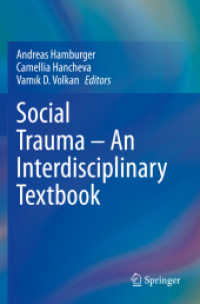- ホーム
- > 洋書
- > 英文書
- > Politics / International Relations
Full Description
Many believe the recent deterioration in US-China relations represents a 'New Cold War' rooted in ideological differences. However, such differences did not prevent the two countries from pursuing economic integration and geopolitical cooperation in the 1990s and 2000s. Ho-fung Hung argues that what underlies the change in US-China relations is the changing relationship between US-China corporations. Following China's slowdown after 2010, state-backed Chinese corporations turned increasingly aggressive when they expanded in both domestic and global markets. This was at the expense of US corporations, who then halted their previously intense lobbying for China in Washington. Simultaneously, China's export of industrial overcapacity has provoked geopolitical competition with the United States. The resulting dynamic, Hung argues, resembles interimperial rivalry among the great powers at the turn of the twentieth century.
Contents
1. Introduction: Political Sociology of Global Conflict; 2. Symbiosis; 3. Intercapitalist Competition; 4. Spheres of Influences; 5. Conclusion Inter-Imperial Rivalry Redux; 6. References.








